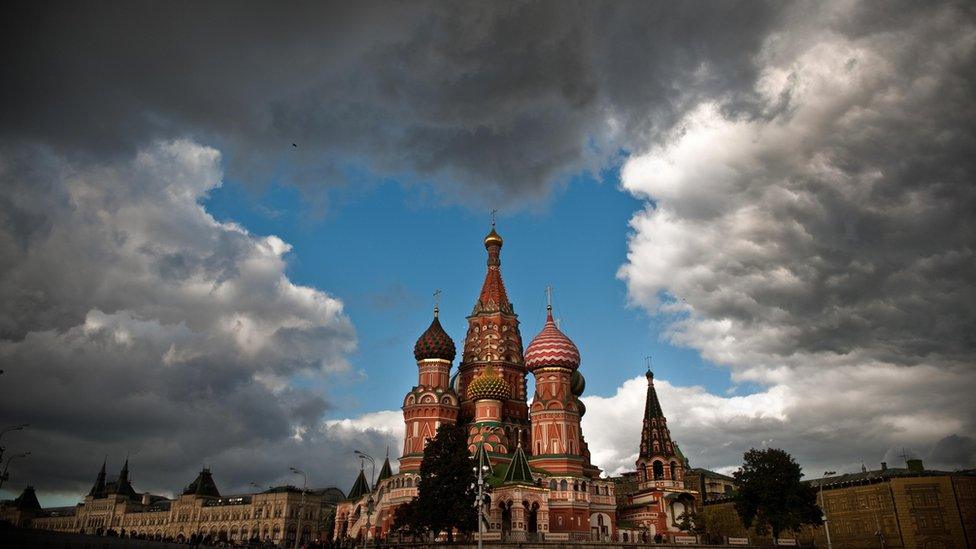Trump wiretapping claim: Did Obama bug his successor?
- Published
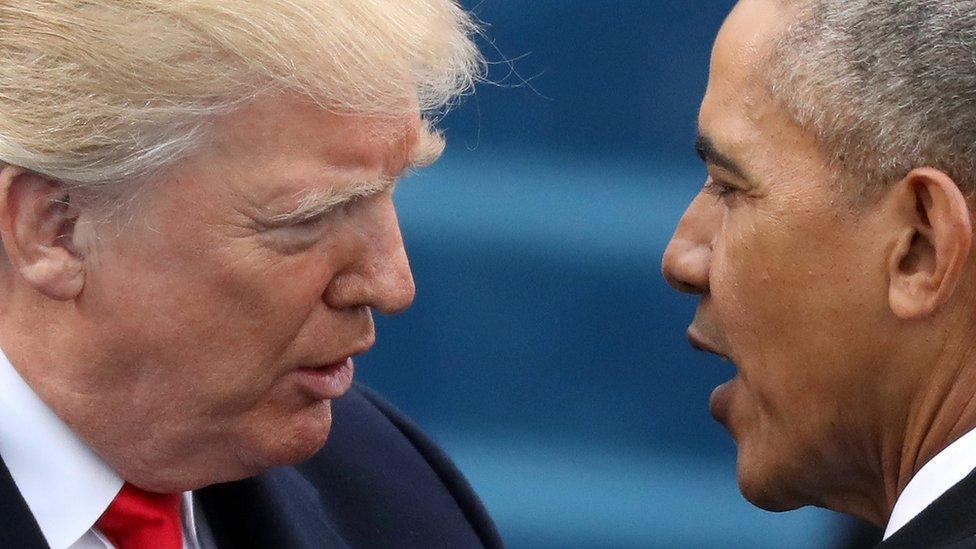
President Donald Trump has accused his predecessor Barack Obama of spying on him
They were arguably Donald Trump's most striking claims to date: a series of tweets, accusing then-President Barack Obama of wire-tapping Trump Tower during the election.
They were not backed up by any evidence, and Mr Obama's spokesman and former US intelligence chief James Clapper denied that any wiretap had been ordered.
President Trump urged Congress to investigate, alongside its current investigations into allegations of Russian hacking during the election. But still no evidence has emerged.
What does the FBI say?
FBI Director James Comey for the first time on Monday confirmed to the House Intelligence Committee that the agency is investigating possible links between Russia and Mr Trump's associates as part of a broader inquiry into Moscow's interference in last year's election.
He also disputed Mr Trump's wiretapping claims.
"With respect to the president's tweets about alleged wiretapping directed at him by the prior administration, I have no information that supports those tweets, and we have looked carefully inside the FBI," he told the panel.
After Mr Trump's tweets earlier this month, the New York Times quoted unnamed senior officials reporting that Mr Comey had said the claim was false and had asked the justice department to publicly reject it.
Mr Clapper said the intelligence agencies he had supervised did not wiretap Mr Trump last year, and nor did the FBI obtain a court order to monitor Mr Trump's phones.
As intelligence director, he told NBC, he would have known about a "court order on something like this".
This is a reference to the US Foreign Intelligence Surveillance Court, which can grant wiretaps on the grounds of national security.
James Clapper says he "can deny" that Donald Trump's phones were tapped
Has Congress found any evidence?
Several senior Republicans have rejected the allegations after congressional committees looked into them.
Senate Intelligence Committee chairman Richard Burr said on 16 March there were "no indications" that Trump Tower was the subject of surveillance by any element of the US government either before or after Election Day 2016.
Earlier that day, House Speaker Paul Ryan also said "no such wiretap existed".
And the previous day, House of Representatives Intelligence Committee chairman Devin Nunes said: "We don't have any evidence."
"I don't think there was an actual tap of Trump Tower," he told a news conference.
"Are you going to take the tweets literally?" asked Rep Nunes. "If so, clearly the president was wrong."
Trump's wiretap saga explained in two minutes
What about the justice department?
It hasn't said yet. It has asked for more time to respond to the House Intelligence Committee's request that it provide evidence.
But Mr Comey on Monday also said the justice department found no evidence to support the president's allegations.
Is the White House standing by its claims?
Yes. "He stills stands by it", asserted White House press secretary Sean Spicer in the wake of the congressional intelligence committees' statements.
He said the congressional investigations "have not been provided with all of the information".
However, despite the fact that one of Mr Trump's tweets specifically accused Mr Obama of tapping his phones, the subsequent White House definition of wiretap is broad.
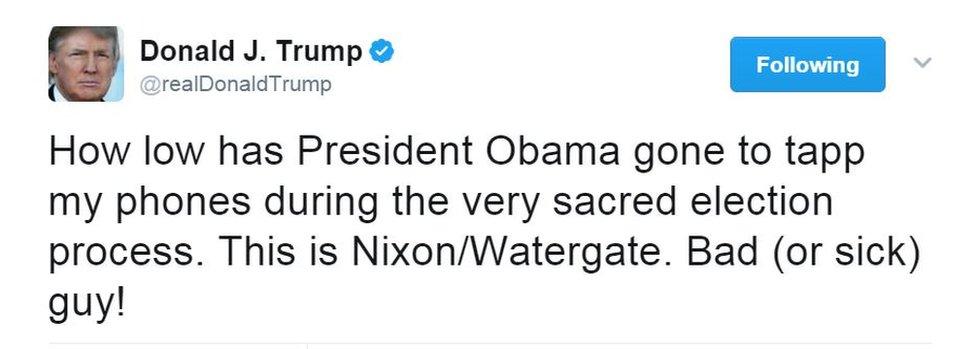
"Wiretap covers a lot of different things. I think you're going to find some very interesting items coming to the forefront over the next two weeks," Mr Trump told Fox News on 16 March.
Two days earlier, Mr Spicer had said: "The president used the word wiretap in quotes to mean broadly surveillance and other activities."
Mr Spicer has cited comments made on Fox News by former judge Andrew Napolitano, who said "three intelligence sources" had told Fox News that President Obama had used the British spy agency GCHQ to install wiretaps.
He said the White House was "not passing judgement" on such reports, but they needed looking into.
The White House press secretary pointed to Fox News sources
GCHQ, which does not normally comment on news reports, said the claims were "nonsense, utterly ridiculous and should be ignored".
On Monday, National Security Agency (NSA) Director Michael Rogers also rejected the claims that British intelligence services were behind the wiretapping claims during testimony before the House committee.
The allegation "clearly frustrates a key ally of ours", he said.
Could Obama have ordered the surveillance?
Mr Obama's team say Mr Trump's tweets are "simply false".
A warrant, if it existed, would most likely have been ordered by the Department of Justice independently of the White House.
Former press secretary Josh Earnest told ABC: "This may come as a surprise to the current occupant of the Oval Office, but the president of the United States does not have the authority to unilaterally order the wiretapping of an American citizen.
"If the FBI decided to use their wiretapping authority in the context of the counterintelligence or criminal investigation, it would require FBI investigators, officials at the Department of Justice going to a federal judge and making a case, and demonstrating probable cause to use that authority to conduct the investigation. That is a fact."
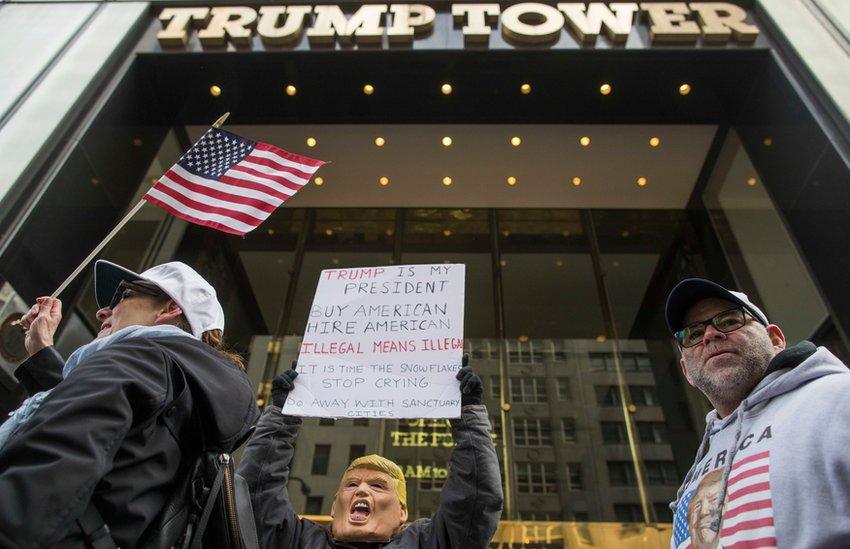
It is unclear whether the claims have any basis in fact
The only way Mr Obama could have ordered surveillance without going through the Foreign Intelligence Surveillance Court (Fisa court) is if there were no US citizens involved.
In this case, considering the target is allegedly Trump Tower - which definitely involves American citizens - this would have been hard to argue.
What is the Fisa court?
The Fisa court has been described by CNN as possibly "the most powerful court you have never heard of".
The secretive court approves surveillance warrants under Fisa against "agents of a foreign power", mainly to either the FBI or NSA.
In this case, the reported target of the FBI's application was two Russian banks.
Any application has to be approved by one of 11 sitting judges.
Where did the wiretap claim come from?
Rumours of an order granted under the Foreign Intelligence Surveillance Act have been circulating for some time.
On 7 November - the day before the country went to the polls - former British MP Louise Mensch reported the order was approved in October, external.
According to Ms Mensch, it was issued in connection with a private server and activity between two Russia banks.

She also mentions - like Mr Trump in his tweets - that an earlier order had been turned down.
In January, the BBC's Paul Wood - writing in the wake of claims the Russian government had compromising material on Mr Trump - said he also knew of the Fisa order.
Neither Mr Trump nor his associates are mentioned in the order, our correspondent reported.
The Guardian also mentioned, external the order at about the same time.
None of them mention wiretapping of phones.
It is then seemingly not mentioned again until Mark Levin, a conservative radio host in the US, talked about it two days before Mr Trump's tweets.
His show was followed up with an article in Breitbart, external the following day, which mentions wiretapping and "eavesdropping" sought by the "Obama administration". It is not clear how their claims were sourced.
- Published6 March 2017
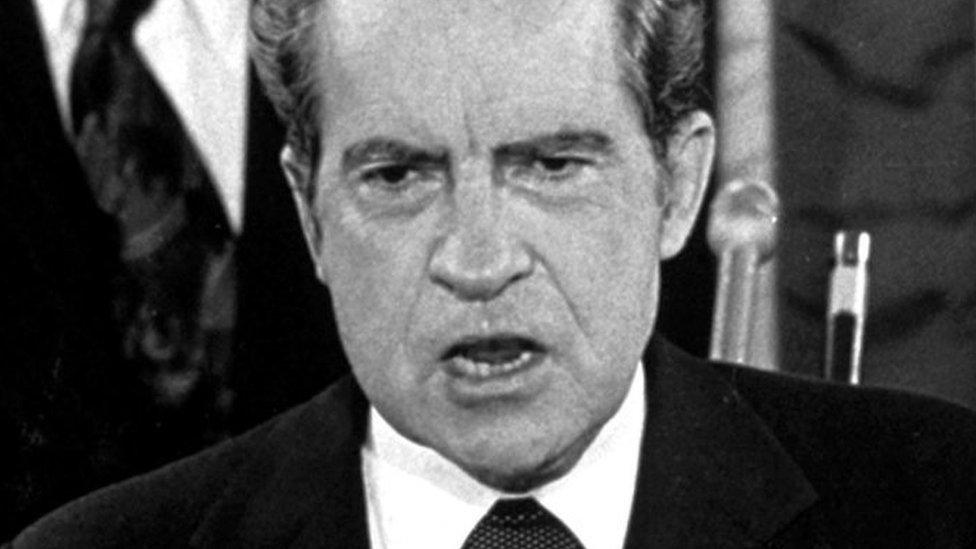
- Published14 September 2018
